Are You A Vanguard? Applications Now Open
Jonathan Chng/Unsplash
This is your first of three free stories this month. Become a free or sustaining member to read unlimited articles, webinars and ebooks.
Become A MemberIn 2019, energy companies announced a plan to route a major crude oil pipeline through Boxtown and other mostly Black communities in southwest Memphis. The location had been chosen, a company representative stated then, because it was the “point of least resistance.”
But residents came together, proving the company wrong. In 2021, a powerful grassroots movement shut down the pipeline, which would have been built through a historic neighborhood founded by emancipated people and atop the world-famous Memphis Sand Aquifer.
Now, two years later, the same activists are working to get reliable, safe drinking water for their communities.
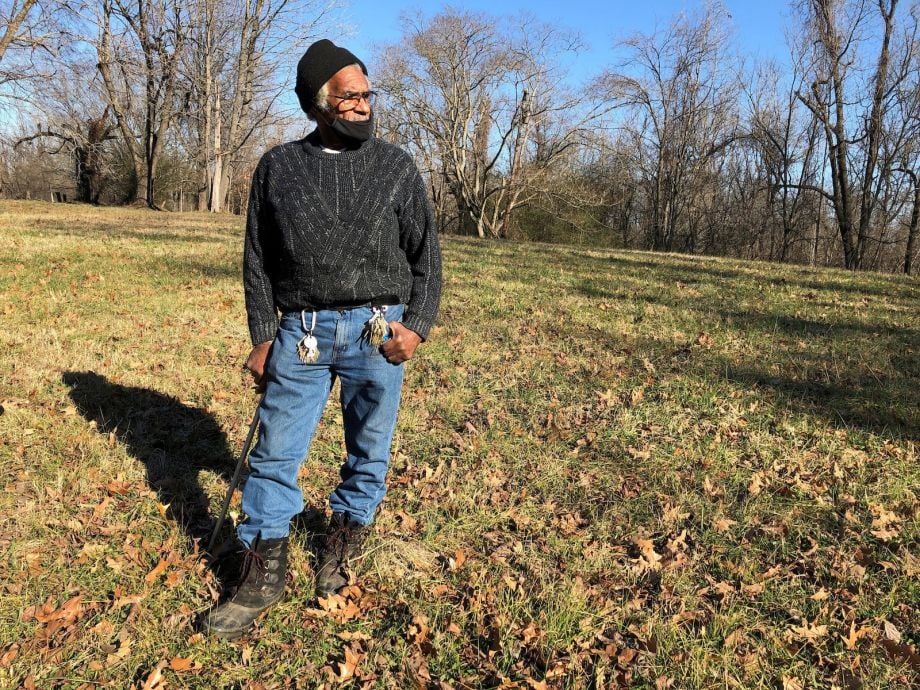
In this 2021 AP file photo, Clyde Robinson, 80, speaks with a reporter while standing on his acre-sized parcel of land, in Memphis, Tenn. Robinson was fighting an effort by two companies seeking a piece of his land to build part of an oil pipeline that would run through the Memphis area into north Mississippi. (AP Photo/Adrian Sainz, File)
Memphis sources its water from an ancient, subterranean lake that is thousands of feet deep — naturally filtering pristine freshwater in its layers of silt and clay. Yet when residents turn on their faucets, they don’t know if the water coming from their tap is safe to drink, says Yolonda Spinks, an organizer with Memphis Community Against Pollution, an organization that formed out of the fight against the pipeline.
“We have the sweetest water in the world,” she says. “We need to make sure everyone has access to it without it being a public health issue.”
Shelby County, which encompasses Memphis and is Tennessee’s only majority-Black county, is among the state’s most polluted districts. About a third of the state’s 19 Environmental Protection Agency-designated Superfund sites are within the county, and the agency acknowledges that chemicals from industrial production and waste — including arsenic, lead, chromium and nickel – have contaminated groundwater there.
Yet the problem is further compounded both by deep-seated government mistrust as well as aging infrastructure that some South Memphis residents believe is exposing their vulnerable communities to lead: More than 14,000 water lines in the city contain lead or require further inspection, according to Memphis, Light, Gas, and Water (MLGW).
The result is that in Memphis, just as across the country, communities of color disproportionately rely on expensive, store-bought water or filters for safe drinking water. Spinks, whose organization distributes free bottles to South Memphians, estimates that she herself spends $800 a year on bottled water. It’s a cost many cannot afford.
For Spinks and other local organizers, their fight is a microcosm of a broader national crisis where the government has fallen short in delivering adequate public services to Black and low-income neighborhoods, compelling residents to purchase access to basic necessities from private corporations.
In 2019, authorities identified more than 30 schools that tested positive for unsafe lead levels in drinking water sources. Close to 200,000 homes in Memphis were built before 1978, when lead paint and pipes were common, but an incomplete inventory means it’s unclear just how many homes in the city have lead pipes.
MLGW’s best source of data on lead pipe service lines was drawn from a floppy disk from the ‘90s, discovered in its archives in 2016. The agency used this database to conduct inspections of nearly 39,500 services and verify that 14,040 lines had lead or needed further evaluation.
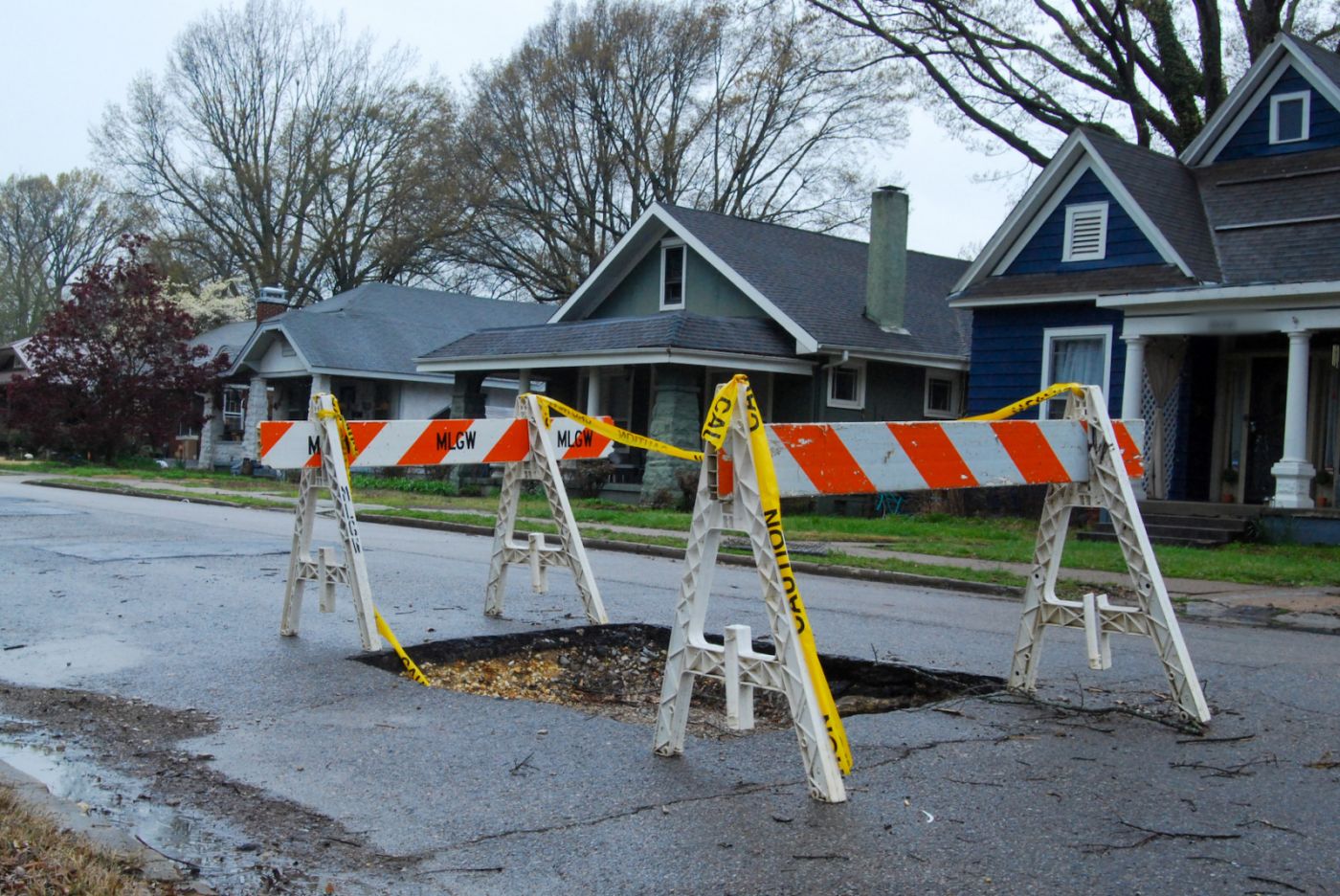
MLGW replaces lead pipes on a public road in midtown Memphis. MLGW has replaced around 2,100 lead service lines, but more funding is needed for pipes to be replaced on private property. (Photo by Ashli Blow)
An analysis of Environmental Protection Agency (EPA) data from 2016-2019 found that public water systems that consistently violated the Safe Drinking Water Act were 40% more likely to serve people of color. Racial segregation from historical racist policies like redlining has worsened the effects of lead exposure.
So has climate change.
In 2015, after the Flint water crisis erupted in Michigan, Memphis native LaTricea Adams helped found Black Millennials 4 Flint, an organization pushing for lead-free communities. More recently, Adams has witnessed how intense, unprecedented storms has become another barrier to safe water.
“Climate change is a thing and a competing issue,” says Adams, an educator and local environmental justice activist. “Everything halts if there is some kind of extreme weather disaster.”
As more extreme weather events in the city break aging infrastructure and lower water pressure, the city is advising residents to boil their water. Yet that may be further endangering residents.
When an advisory goes out, Adams emails MLGW, reminding the utility to caution people about lead poisoning amid boil water advisories. Boiling water can kill bacteria, but it does not remove lead; in fact, it can potentially increase the concentration of the element in water. The utility tells Next City that this messaging is now included in its advisories.
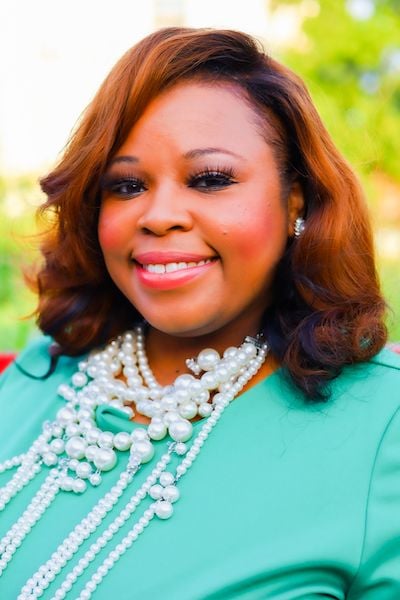
LaTricea Adams (Courtesy photo)
Advocates are instead encouraging residents to use filtered water. “The reason why, from an economic perspective, is you’re already paying for water,” says Adams, referring to how residents receive a monthly water bill from MLGW. “So you’re paying for water twice if you do purchase [bottled] water.”
More importantly, she says, they are demanding that the tap water, for which residents have already paid, is safe and lead-free.
In June and July, back-to-back thunderstorms and high winds caused power outages and depressurized water systems, followed by a heat wave. It was one of the most devastating weather events in MLGW’s history, worse than what the city experienced when the outer bands of Hurricane Katrina came through in 2005.
The summer storm included supercells, rotating winds which have the potential to create tornadoes. By the end of the century, such supercells could increase in frequency by nearly 7% because of a warming environment, according to the nonprofit Climate Central.
Responding to these storms is expensive, and the repairs take money and attention away from proactively replacing perilous infrastructure like lead pipes. It also leaves Memphians like Spinks to worry about her neighbors who could be experiencing lead poisoning year-round.
Most utilities, including MLGW, send home test kits upon request for people to test their water. If any lead is detected, people receive a filter, but if it’s at a high level, the EPA recommends drinking bottled water.
“Growing up, my mom said we don’t drink tap water,” says Spinks. “I didn’t know why until I started doing environmental justice work.”
The story of environmental justice in South Memphis goes back to when Boxtown’s emancipated residents built their homes from railroad cars. In the Reconstruction era, they were sole stewards of the land, as dirt roads isolated them from downtown Memphis. While industry sprawled around them, Boxtown residents had no running water or plumbing until the 1980s.
Uncertainty about safe water has dogged Black Americans, in Memphis and beyond, since.
Political scientist Samantha Zuhlke examines this legacy of unreliability for disenfranchised Black and Hispanic communities across the southeastern U.S. in the 2022 book “The Profits of Distrust.” She and her coauthors link communities’ drinking water and civic engagement by comparing counties protected by the Voting Rights Act to those not protected.
“What we found is that bottled water sales today are higher in counties that were not protected,” Zuhlke says. “The general thesis is that the communities that were historically most alienated or discriminated against by the government are the ones most likely to purchase bottled water today. It’s a private solution to a public problem.”
At the start of the century, Americans spent $6.9 billion on unflavored, non-carbonated bottled drinking water. Over 20 years, it’s steadily risen to $36.2 billion, according to Zuhlke’s research.
As the industry grows, private companies are making bold claims about sustainability as they begin offering services that don’t rely on disposable water bottles. Rather than single-use plastics, some companies are expanding into water stations, standalone kiosks where people can buy water by the gallon.
These companies advertise that they are providing safe and affordable drinking water, but people who use these services are essentially purchasing water twice: once as a public taxpayer, and again as a private customer. It’s also unclear whether these stations are subject to the same regulation as utilities are under the Safe Drinking Water Act, experts say.
Zuhlke’s book offers 12 proposals for safe and affordable water from the tap, ranging from infrastructure investments to modernizing management. Specifically, the book recommends that utility companies create space for internal advocates and watchdogs to enable change within these agencies.
Until that happens, grassroots groups are holding these agencies’ feet to the fire.
Protect Our Aquifer (POA) is an advocacy group that works closely with organizations like MCAP and Black Millennials 4 Flint. Their work includes tracking contaminated hotspots throughout the aquifer. Chemicals are leaching in and near the aquifer’s layers, such as arsenic from a coal ash pile and pesticides from manufacturing facilities dumping waste.
The group monitors the largest polluters in the city, tracks how businesses are drawing water, and questions the allocation of government resources for infrastructure upgrades — all with the aim of ensuring the quality of the region’s most valuable natural resource.
POA is currently pushing for stronger regulations as a new wave of industrial development moves into the city. They are working with the health department on enacting a conservation fee for private well users, mainly big industries in the city. That would help with generating revenue for public services and pollution control.
“Our aquifer is incredible, but that doesn’t matter if our water is getting contaminated traveling through lead pipes,” says Mersadies Burch, POA’s operations and development manager.
“Implementing regulations on the books, that is a big fight in and of itself. But if you take a step back, and people aren’t able to drink the water that comes out of the tap because it’s contaminated, what are we doing here?”
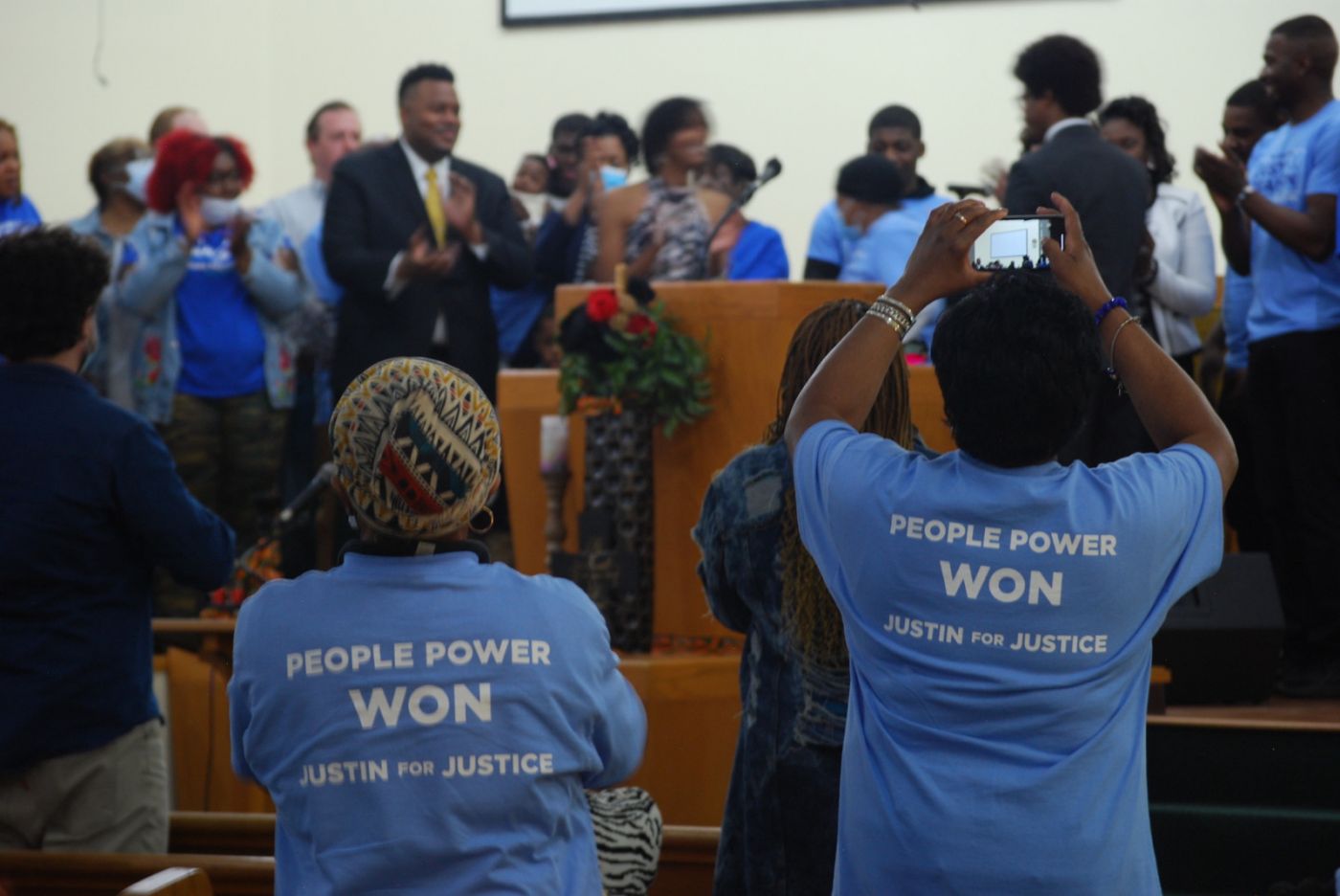
Rep. Justin J. Pearson’s swearing in this spring was a celebration of “people power.” It’s a movement the community credits with stopping a corporation from putting a pipeline through South Memphis. They continue to advocate for other needs like access to safe water. (Photo by Ashli Blow)
The EPA’s lead and copper rule will require all U.S. water systems to complete a full system inventory by 2024.
MLGW made a commitment in 2016 to replace 2,000 service lines a year, but it eventually cut its replacement goal in half due to budget cuts. Over the past five years, crews have replaced 2,169 lead service lines, according to its 2023 Budget and Service Improvement Plan.
Those replacements can be risky, as Adams along with groups like Memphis & Shelby County Lead Safe Collaborative have raised to MLGW.
Cutting a pipe, as in a partial line replacement, can cause corrosion while dislodging tiny slivers of lead. Not only can the particles get into the water, but they can get caught in the aerator of the sink. Corrosion — from acidity levels, warm temperatures and age — is usually how lead dissolves and enters drinking water.
MLGW calls these local organizations’ awareness work instrumental to the utility’s services. “[They] came to us and said ‘Hey, there is research that says this is bad,’ and we stopped doing it,’” says Nick Newman, vice president of engineering and operations.
In the past, MLGW couldn’t use taxpayer funding to replace pipes that go beyond a curb or meter and onto public property, putting the onus on homeowners to pay for the replacement of such pipes that go into their homes.
That could change with American Recovery Plan funds. Newman says MLGW plans to use $5 million in federal funding to pilot a program to replace private lead service lines on the property side of the meter. The program will target homes that already had their MLGW water service lines replaced.
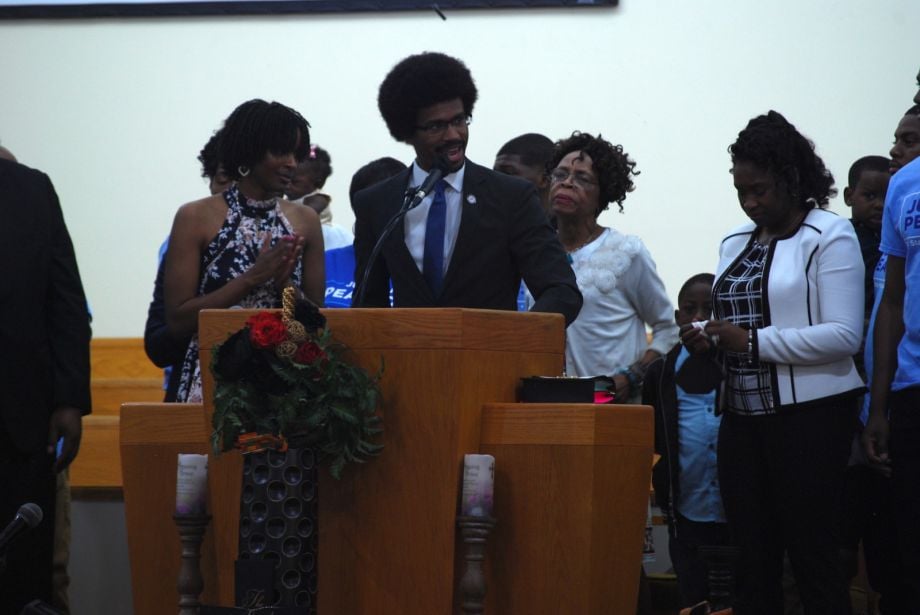
Kimberly Owens-Person stands next to her son, Rep. Justin J. Pearson, during a swearing in ceremony at Mt. Pisgah Church in March. During the ceremony, she gave a speech about the generational fight to overcome environmental justice. (Photo by Ashli Blow)
For Memphis’ environmental movement, this action marks a small but important step forward. The activists’ efforts are what recently re-elected Rep. Justin J. Pearson — who helped lead the fight against the Byhalia pipeline and cofounded MCAP, and recently made national headlines when he was expelled and reinstated to the Tennessee House — calls “people power.”
During Pearson’s swearing-in ceremony, his mother spoke about how it’s a generations-old tool that the community used against the pipeline and that they will continue to use it for justice.
“It’s what our ancestors believed in, it’s what his parents and grandparents and the extended family of the neighborhood believes in,” says Kimberly Owens-Pearson, herself a leading figure in the local environmental justice movement.
“With people power, it just really ignites us, and it is contagious because you can feel it. We are a resilient people.”
This story was made possible in part with funding from the Institute of Journalism and Natural Resources.
Ashli Blow is a freelance journalist who covers environmental science and policy.

20th Anniversary Solutions of the Year magazine